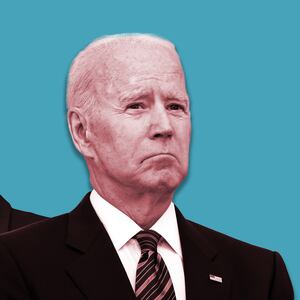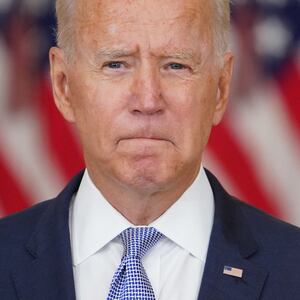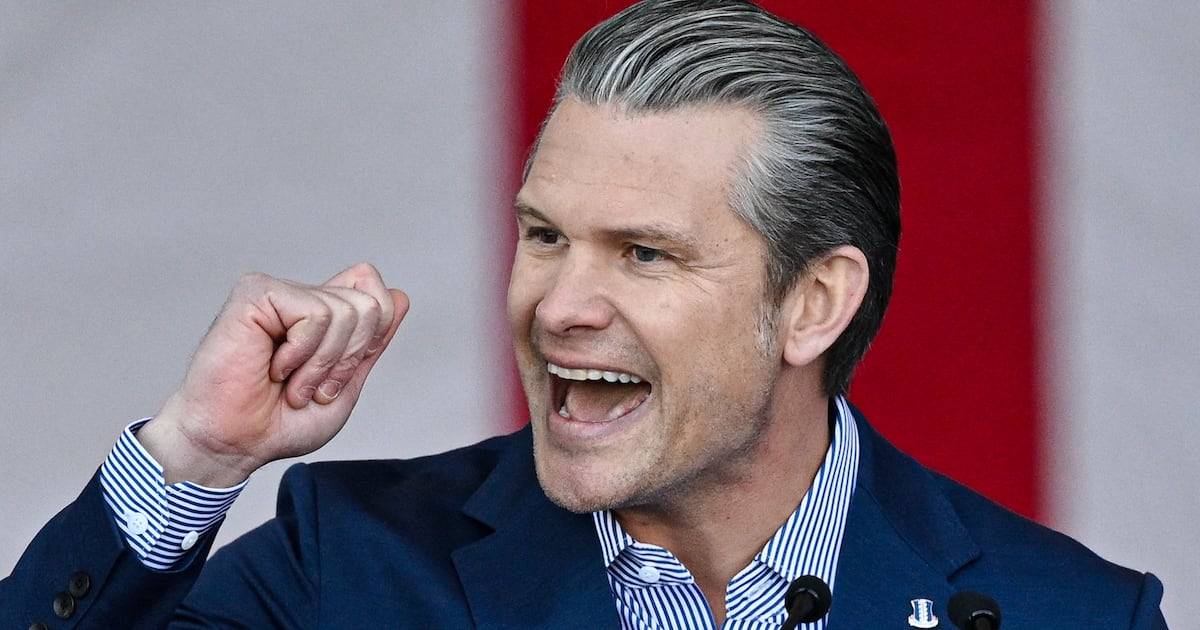When Rep. Jim Langevin (D-RI) watched the final scenes of the U.S. war in Afghanistan unfold on Sunday, he decided to do something few other Democrats did: publicly blame President Joe Biden.
Unlike some Democratic critics of Biden’s Afghanistan policy, however, Langevin wasn’t just criticizing his president for how he withdrew American military forces from the country; he laid into Biden for withdrawing troops at all.
Langevin, who has served on the House Armed Services Committee since the war began in 2001, wrote an op-ed in Foreign Policy on Tuesday arguing that the “catastrophe” unfolding in Kabul—now defined forever by images of a desperate effort from U.S. citizens and Afghan allies to flee after a rapid Taliban takeover—was why he opposed Biden’s plan to withdraw by the 20-year anniversary of the conflict.
“This negligence was par for the course for the last U.S. administration,” wrote Langevin. “I am disappointed to see it now.”

Rep. Jim Langevin of Rhode Island is one of the few Democrats in Congress who have publicly blamed President Joe Biden for the Afghanistan debacle.
Anna Moneymaker/GettyA few senior Democrats also piped up to match that rhetoric. Sen. Bob Menendez (D-NJ), a noted hawk and chair of the Senate Foreign Relations Committee, said he was “disappointed that the Biden administration clearly did not accurately assess the implications of a rapid U.S. withdrawal.”
But far more Democratic lawmakers have stayed publicly silent on the Afghanistan withdrawal. From rank-and-file members to ostensible experts on the House Armed Services panel—including the chairman, Rep. Adam Smith (D-WA)—they haven’t so much as tweeted about the situation, much less appeared in print or on cable to discuss.
In an interview with The Daily Beast, Langevin said he had not spoken with many colleagues, but believes he is hardly the only Democrat convinced that the last 72 hours have proved Biden’s strategy was a mistake.
“I’m sure that there are many on both sides of the aisle who are as upset as I am about the way this has unfolded,” he said on Wednesday. “If the president was going to follow through on this, he owed the American people, our troops, and our partners a much more well-thought-out and better-executed plan”
Clearly, plenty of Republicans feel similarly. They’ve launched withering, non-stop criticism of Biden’s handling of the exit, even though most supported the idea when Donald Trump was actively pushing it.
In April, a number of congressional Democrats publicly expressed their concern about this exact scenario after Biden announced he would move forward with the September withdrawal timeline.
Despite that, when the breakdown they feared actually happened, a handful of hawks found themselves mostly alone in publicly putting the screws to Biden.
Rep. Tom Malinowski (D-NJ), for example, said in April that he opposed Biden’s decision, arguing that “removing our troops will not end the war in Afghanistan, or protect us against terrorism.” A former diplomat himself, Malinowski is now focusing on getting Afghan allies out of the country and needling the Biden administration for their handling of that issue.
And Sen. Jeanne Shaheen (D-NH), a senior member of the Senate Armed Services Committee who also opposed a swift withdrawal, issued a lengthy statement Monday largely urging the Biden administration to prioritize evacuations and international efforts to protect women, girls, and other vulnerable groups after the Taliban takeover.
The reason Democratic hawks are increasingly isolated stems from more than just their gradual marginalization within a Democratic Party no longer wholly dominated by a pro-intervention, defense industry-friendly consensus. In fact, there are plenty of other lawmakers who share Langevin’s views.
But according to several Democratic aides, it’s not surprising that few are pushing them so publicly. It all stems from the old kindergarten adage apparently prevailing in the party right now: If you don’t have something nice to say, don’t say it at all.
At least in public. Smith may be scarce in the media, but he was blunt during a private member call on Tuesday to discuss Afghanistan.
“Don’t try to sugarcoat this,” the chairman advised his colleagues, according to a source familiar with the remarks. “Don’t try to make this look better than it is.” (A Smith spokesperson did not offer a comment by press time.)

“Don’t try to make this look better than it is,” Rep. Adam Smith (D-WA) told colleagues privately. Publicly, he’s not saying much at all.
Chip Somodevilla/GettyIndeed, the end of a messy, 20-year war—a project owned by virtually the entire Washington establishment—does not lend itself to neat sound bites, nor does it lend itself to friendly spin for the commander-in-chief overseeing the withdrawal.
That was underscored on Monday, when White House talking points on Afghanistan were distributed to House Democrats and were promptly picked apart by experts. One of them, for example, suggested responding to the debacle around special visas for Afghan allies by arguing that many chose not to leave when they had a chance.
Malinowski responded to that by saying anyone writing those talking points “should get in the visa line.” Aides grumbled that the messaging strategy was worse than useless.
Faced with having to muddle through some happy-talk or criticize Biden, many Democrats are just opting out of the debate entirely.
Aside from the general absence of tweets, public statements, and TV hits discussing Afghanistan from Democrats, both the House and Senate are out of D.C. for August recess, so reporters can’t bother them in the hallways with questions.
One lawmaker—Sen. Gary Peters (D-MI)—had to come to the Capitol on Tuesday to open a perfunctory Senate session, and his interaction with reporters was revealing. Several pestered him with questions about Afghanistan as he left the floor, according to a CNN reporter, but he ignored all of them. Peters is the chairman of the Senate’s panel on homeland security.

Sen. Gary Peters (D-MI) simply ignored reporters’ questions about the administration’s decision-making.
Graeme Jennings/GettyThat silence is more than conspicuous to many Democrats. Even in the privacy of caucus calls, lawmakers haven’t gone especially hard after Biden directly—they have mostly vented frustration over the U.S. leaving Afghan allies stranded and the sense that Biden’s team botched evacuations, according to multiple Democratic lawmakers.
“I’ve heard Democrats say if this were Donald Trump, every floor speech would be about this,” said a senior Democratic aide close to the moderate wing of the party. “Two-thirds of our caucus would rather set their face on fire than criticize the president.”
The intensification of Republican criticism has added another incentive for silence: not boosting what Democrats see as bad-faith arguments from Republicans and creating a bipartisan pile-on.
“Most people don’t want it to turn into a bipartisan backlash that hurts Biden,” said a senior Democratic Senate aide. “No one wants to be seen as ganging up on a president of our own party.”
Another House Democratic aide echoed that point, saying “folks are wary of criticizing the administration directly” so as not to hand the GOP ammunition. A Democrat familiar with recent calls and discussions told The Daily Beast there is even some frustration percolating from Biden loyalists that some aren’t doing enough to defend the president.
Asked about that argument, Langevin downplayed any political angle by noting his consistency on the topic. “I thought that President Trump was wrong when he proposed a troop withdrawal at an arbitrary and capricious date,” he said.
Opposite the camp of hawks, there are a number of Democrats who are taking an opportunity to publicly stand behind Biden at a challenging time. The president has gotten a needed boost this week from a new crop of lawmakers, many of whom fought in Afghanistan themselves, who are making the rounds on cable and in print casting him as the commander-in-chief who finally had the backbone to end the war.
Rep. Jake Auchincloss (D-MA), a freshman and Marine veteran who served in Afghanistan, said on MSNBC Tuesday that Biden “made the high-integrity decision that he was not going to hand off this boondoggle to yet another administration.”
That gets at another reason behind the hawks’ loneliness: the Democratic conventional wisdom remains that the voting public will credit rather than scorn Biden in the long term for ending an expensive, costly, and increasingly pointless war.
“Most Democrats agree with Biden’s read of the politics,” said the Democratic Senate aide, adding that the party is largely supportive of his main focus: getting a nearly $5 trillion infrastructure and economic package through Congress.
This is the ground Biden has focused on as he justifies his decision under scrutiny. “I cannot and I will not ask our troops to fight on endlessly… in another country’s civil war, taking casualties, suffering life-shattering injuries, leaving families broken by grief and loss,” Biden said in his address to the country on Monday.
Regardless of their frustrations with Biden’s handling of the situation, that is a line of argument few Democrats will publicly disagree with—though Langevin tried.
“A small, limited footprint of 2,500 troops, in my mind, was a good bargain for what we got in return,” he argued, citing the occupation’s protection of women and minorities from Taliban rule. “None of us wants this to be an open-ended, never-ending mission. I get that.”
But the Rhode Island Democrat didn’t offer any specific condition under which U.S. forces could leave in good conscience, bolstering Biden and allies’ effort to cast his decision as one of endless war versus a principled departure.
“He’s the president of the United States, this is the call he made,” Langevin said. “Maybe down the road, it proves to be the right call. I don’t see how.”










